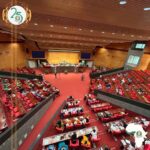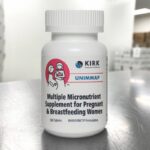By Folasade Akpan
The National Bureau of Statistics (NBS) says the Consumer Price Index (CPI) rate in Dec. 2020 rose by 0.86 per cent to 15.75 per cent from 14.89 per cent recorded in November.
It said this in the “Consumer Price Index (CPI) Dec. 2020” report released on Friday in Abuja.
It added that increases were recorded in all Classification of Individual Consumption by Purpose (COICOP) divisions that yielded the Headline Index.
According to the NBS, on month-on-month basis, headline index increased by 1.61 per cent in December which was 0.01 per cent rate higher than the rate recorded in November at 1.60 per cent.
“The percentage change in the average composite CPI for the twelve months period ending December over the average of the CPI for the previous twelve months period was 13.25 per cent, representing a 0.33 per cent increase over 12.92 per cent recorded in November.
“The urban inflation rate increased by 16.33 per cent (year-on-year) in December from 15.47 per cent recorded in November, while the rural inflation rate increased by 15.20 per cent in December from 14.33 per cent in November.”
The report indicated that on a month-on-month basis, the urban index rose by 1.65 per cent in December, same as the rate recorded in November, while the rural index also rose by 1.58 per cent in December, up by 0.02 per cent above the rate that was recorded in November (1.56 per cent).
It added that the corresponding 12-month year-on-year average percentage change for the urban index was 13.86 per cent in December.
“This is higher than 13.55 per cent reported in November, while the corresponding rural inflation rate in December was 12.67 per cent compared to 12.35 per cent recorded in November.”
For composite food index, the NBS said that it rose by 19.56 per cent in December compared to 18.30 per cent in November.
The rise was caused by increases in prices of bread and cereals, potatoes, yam and other tubers, meat, fruits, vegetable, fish, oils and fats.
It added that on month-on-month basis, the food sub-index increased by 2.05 per cent, up by 0.01 per cent from 2.04 per cent recorded in November.
“The ”All items less farm produce” or Core inflation, which excludes the prices of volatile agricultural produce stood at 11.37 per cent in December, up by 0.32 per cent when compared with 11.05 per cent recorded in November.
“On month-on-month basis, the core sub-index increased by 1.10 per cent in December. This was up by 0.39 per cent when compared with 0.71 per cent recorded in November,” the report said.
It also said that the highest increases were recorded in prices of passenger transport by air, medical services, hospital services, shoes and other footwear, passenger transport by road, miscellaneous services relating to the dwelling, hairdressing salons and personal grooming establishments.
Others were repair of furniture, vehicle spare parts, pharmaceutical products, motor cars, maintenance and repair of personal transport equipment, paramedical services, motor cycle, dental services and bicycles.
For state profiles, the NBS said that for the month under review, all items inflation on year on year basis was highest in Bauchi at 19.85 per cent, Edo at 18.15 per cent and Kogi at 18.40 per cent.
Lagos has 14.05 per cent, Kwara at 13.91 per cent and Abia at 13.3 per cent recorded the slowest rise in headline Year on Year inflation.
On month on month basis, however, December all items inflation was highest in Nasarawa at 2.3 per cent, Gombe at 2.2 per cent and Akwa Ibom at 2.16 per cent.
Ekiti which stood at 0.87 per cent, Rivers at 0.67 per cent and Ebonyi at 0.61 per cent recorded the slowest rise in headline month-on-month inflation.
The report said that food inflation on a year-on-year basis was highest in Edo at 24.14 per cent, Kogi at 23.14 per cent and Sokoto at 22.24 per cent.
Meanwhile Bauchi at 16.53 per cent, Abia at 16.04 per cent and Nasarawa at 15.71 per cent recorded the slowest rise.
The News Agency of Nigeria (NAN), reports that CPI measures the average change over time in prices of goods and services consumed by people for day-to-day living. (NAN)











